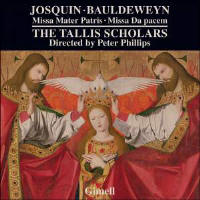Texte paru dans: / Appeared in: Gimell |
|
|
Reviewer: J.
F. Weber The headnote definitely needs an explanation. The Fanfare Archive shows a recording of this Missa Da pacem under Josquin des Prez (Fanfare 2:1), the first of three recordings to be so credited. I also have the second, directed by Clytus Gottwald, but the third (under Fritz Näf) has been elusive for over two decades. As long ago as 1972, Edgar Sparks demonstrated (convincingly for most scholars) that it was composed by Noel Bauldeweyn, a name that has finally appeared in Fanfare in 43:1 with a different Mass. If we would put it under Josquin’s name (as its inclusion in this series would seem to intend), Phillips has recorded 16 of the 20 Masses printed in the old complete works. Still to come on Gimell are Missa D’ung aultre amer (already recorded twice), Missa Allez regretz (spurious and never yet recorded), Missa Faisant regretz (recorded four times), and Missa Hercules Dux Ferrariae, second only to the masterly Missa Pange lingua in frequency on records and the last major work still to be added to the set.
Missa Mater Patris et filia is based on the Brumel motet that precedes it on the disc, as it did on Tetsuro Hanai’s most recent recording (41:5) and on Wilhelm Eschweiler’s early version (3:3). David Fallows, who devoted his massive Josquin (Brepols, 2009) mainly to the securely attributed works, gives this Mass only a few sentences, calling it “the oddest work in the entire canon” and observing that “many critics have doubted that Josquin could possibly have composed such a bizarre piece.” Earlier, in The Josquin Companion (Oxford, 2000, pp. 186–95), Jennifer Bloxam offered a thorough review of the sharply conflicting arguments pro and con the authenticity of the work. It has already been recorded five times (41:5), but none of them was widely distributed.
Phillips finds a link between these two works, one of them formerly evaluated as one of the composer’s most perfect Masses and now not his at all (Da pacem), the other formerly judged as a lesser and possibly early work and now one of his last and most unusual (Mater patris). The latter is his only parody of a motet (rather than a chanson), culminating in the “crowning glory” of the third Agnus Dei, which simply turns the motet into the middle three voices of a five-voice texture, completed by two newly composed voices. But Phillips then turns the tables, citing the “mesmerizing” third Agnus Dei of Da pacem with three voices in canon and three free voices as an equally valid argument for Josquin’s possible authorship after all. To make his point, he renders the Agnus Dei far more slowly than any previous performance, including a stand-alone version of the movement by Martin Steidler. This way of comparing the same movement of the two Masses makes a fascinating argument about authenticity and renews the question of how to index the second Mass.
| |
|
|
|
|
|
|
|
Cliquez l'un ou l'autre
bouton pour découvrir bien d'autres critiques de CD |
|




